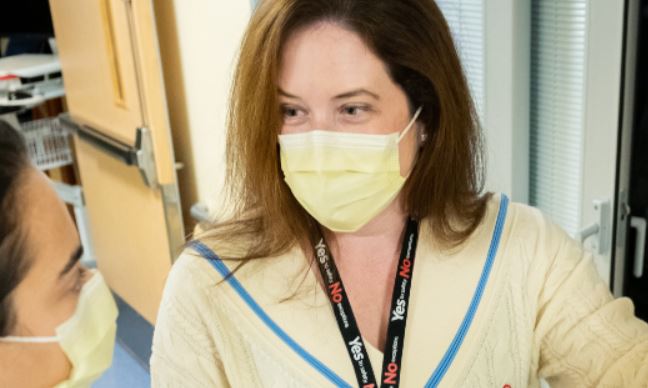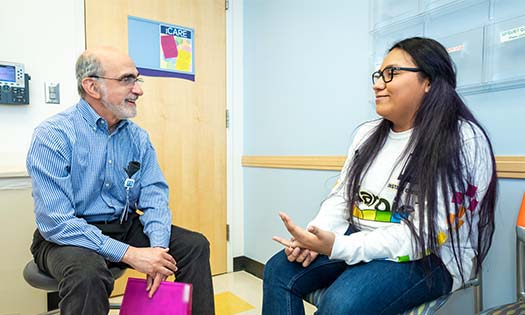The Innovation: Multidisciplinary Clinic for High-Risk Asthma Patients
When children and teens have severe asthma that isn’t controlled by medication, they need a comprehensive and streamlined approach to their care. In January 2022, Children's Medical Center Dallas, part of Children’s Health℠, launched the first pediatric high-risk asthma clinic in North Texas designed to meet the unmet needs of these patients. The clinic’s multidisciplinary team not only tackles complex challenges – from insurance coverage to mental health to obesity – it does this in as few visits as possible to keep care convenient.
The Big Picture: A Holistic Approach that Addresses Everything from Asthma Triggers to Mental Health
Patients with severe, uncontrolled asthma have high hospital utilization rates and ER visits, and are frequently absent from school. What’s more, they often struggle with mental health issues and obesity, which can make it even harder to control asthma. They’re also disproportionately located in underserved areas and of lower socioeconomic status, which can add additional challenges, such as limited insurance coverage.
“For these patients, medicine is a piece of the treatment, but we have to think beyond that,” says Tanya Martinez, M.D., Pediatric Pulmonologist at Children’s Health and Associate Professor at UT Southwestern. “Physical activity, nutrition, psychological therapy, treatment from an allergist, case management and social work may all be a part of the necessary ‘prescription’ to help them better control asthma and improve quality of life.”
From a care standpoint, the key challenge is coordinating across multiple disciplines, while still making care accessible and practical. The new Children’s Health Pediatric High-Risk Asthma Clinic includes pulmonologists as well as a physical therapist, dietitian, psychologist, allergist, social workers and case managers. Together, they’ve developed a streamlined care model to provide all services in one comprehensive center.
Key Details: Empowering Lasting Changes for Children with Asthma
The Pediatric High-Risk Asthma Clinic is focused on serving patients who:
Are at least 2 years old
Are currently on asthma medication
Have been hospitalized three or more times for asthma in the past year, despite their use of asthma medication
For patients who meet those criteria, the clinic provides holistic, individualized care, including:
Pre-clinic evaluations: These include the validated asthma control test as well as surveys about social determinants, behavioral health and mental health. “We review these evaluations as a team and then schedule the patient visit so all the right specialists can be in the room,” Dr. Martinez says.
Treating behavioral and mental health challenges: About 40% of these patients have mental health conditions, like anxiety and depression. “Anxiety not only impacts quality of life, but it can also induce asthma flares,” Dr. Martinez says. “Our psychologist works with patients to address those challenges.”
Addressing obesity: Obesity is also a very common comorbidity, which is partly due to the increased appetite that can come with steroid medications. “For children with obesity, it’s very difficult to control asthma, so our focus is on increasing nutrition and physical activity to help them improve well-being and attain a healthier weight,” she says.
Narrowing the health disparity gap: For many patients, social determinants including allergen exposure, food scarcity, insurance limitations and access to medication are the root cause of uncontrolled asthma. Our social workers help families navigate and overcome these barriers, and case managers help authorize some of the more expensive, cutting-edge medications, including biologics.
Offering virtual visits: The initial multidisciplinary clinic visit is currently in-person, but the psychologist and physical therapist offer a telemedicine option so patients can have easier access. “As we grow and expand, our goal is to offer the multidisciplinary clinic virtually as well,” Dr. Martinez says.
Prioritizing patient education: This clinic also leverages existing Children’s Health programs to educate patients and their families on how to better manage their asthma and health. The Asthma Management Program focuses on asthma education to help patients learn about their asthma and how to use medications and inhalers. The Get Up & Go and Food as Medicine programs empower families to make lasting healthy lifestyle changes. “The goal is to go beyond giving a brochure and explaining a few tips that easily get lost, and to actually help these families integrate changes that will have a lasting impact,” Dr. Martinez says.
Why Children’s Health Pulmonology: Innovation that Improves Quality of Life
Children’s Health is home to some of the nation’s top pulmonologists who are committed to innovation and collaboration.
“We’ve had patients who have missed school for extended periods of time, and some older teens who couldn’t keep their jobs because of their severe, uncontrolled asthma,” Dr. Martinez says. “Our approach aims to not only help patients better control their asthma, but ultimately, to go to school, to go to work and live the life they want.”
Having this cohort of patients treated in one multidisciplinary clinic also presents an opportunity to build a database that fuels continuous innovation.
“We’re tracking outcome measures across disciplines in a comprehensive database, and over time, we’ll identify trends that shape the future of care and further improve quality of life for these patients,” Dr. Martinez says.
Learn more about innovative pulmonology care and research at Children’s Health >>


